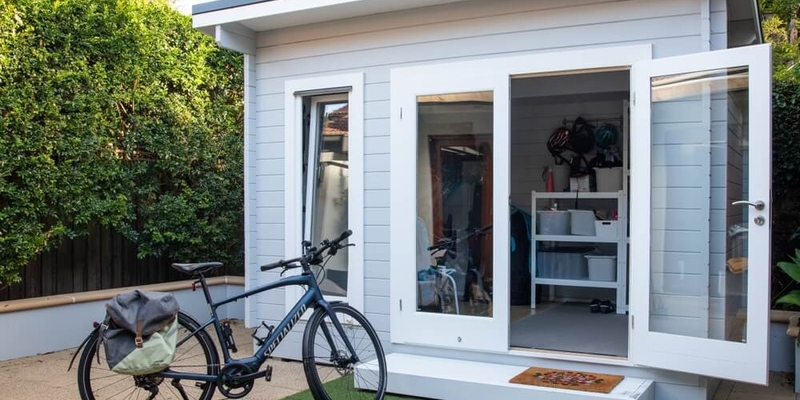
If you are not redirected within 30 seconds, please click here to continue.
Samedi: 10h – 16h HAE

If you are not redirected within 30 seconds, please click here to continue.
If you are not redirected within 30 seconds, please click here to continue.
How to insure your garden suite or laneway home in Canada

Over the past few years, multiple municipalities have changed their zoning laws to allow for garden suites, granny flats and laneway homes. Toronto, for example, started allowing for laneway homes to be built from 2018, with the idea that it would increase the housing stock in a city (and country) that is experiencing a rental and housing crisis.
Along with plenty of advantages, this relatively novel home type does come with unique changes to zoning, permitting and home insurance processes. Certainly, the additional habitable square footage requires additional home insurance — but how does it work? Do you just extend your home insurance coverage? And does the insurance change depending on who moves in, say, a tenant versus a family member?
All about Accessory Dwelling Units
Accessory Dwelling Unit (ADU) is an umbrella term for any second home built on a lot that already has a primary home. It can be a retrofitted garage, a tiny home, coach houses, laneway housing or a garden suite.
ADUs have been in Canada since the 19th century. They weren’t as popular during the rise of suburban living during the ‘50s to ‘70s and were even briefly outlawed in several municipalities. But amidst a growing housing crisis, they, and other forms of secondary housing units, became popular again to fill out the “missing middle” of small and multi-unit mid-rise units.
By 2021, there were 75,000 secondary units in Toronto alone, or one in six houses. The city is now home to the highest number of secondary units in Canada, encompassing everything from basement apartments to separated structures like laneway homes.
Unlike basement apartments and in-law suites, ADUs are often built on the same land as the primary resident unit but separate from the main property. Laneway homes are built over public lanes and alleys (perhaps on top of existing carports), while garden suites sit on a private yard. A tiny home is, well, a tiny home.
How does ADU insurance work?
It depends on the living situation, says Rob de Pruis, the Insurance Bureau of Canada’s National Director of Consumer and Industry Relations. He says that there are a variety of insurance policy types available for landlords and tenants.
“There’s coverage for the property itself,” he says. “Then there’s coverage available for the landlord’s belongings because maybe you’re providing it furnished or unfurnished, such as appliances.”
There’s also coverage for liability such as property damage, bodily injury to someone else as well as loss of income.
“If the tenant can't live there because of some type of insured loss or damage from a fire or something like that, it can provide you with coverage for your loss of rental income until the property is repaired.”
He also said that landlord’s insurance doesn’t cover replacement of the tenant’s belongings, so the tenant might want to consider tenant insurance, which will replace any of their property damaged or lost in an accident.
Learn more: Home insurance and replacement cost
How much coverage is recommended for an ADU?
De Pruis says that the amount of insurance coverage taken out over an ADU comes down to preference. Owners have the option to insure their laneway home as a detached structure under a larger property policy that covers the main residence. (However, that policy should cover the cost to replace everything due to damage or loss).
However, some insurance companies offer a separate policy for laneway or garden suites. The benefits include building replacement cost coverage providing all the conditions in the policy are met. This won’t affect the policy on the main property.
The disadvantage to having two policies is the cost because you’re paying two premiums.
The insurance coverage on a secondary suite, whether it’s an ADU or basement unit, also varies based on who’s living in it. De Pruis says if it’s your child and they’re covered by your current policy, then coverage may extend to the space.
“For example, my 20-year-old son is living with us in the basement. He's out of school, he's working full time, but he pays us a little bit more just to get him used to paying bills,” he says. “So, [he doesn’t] need any special insurance just because he's already covered for his stuff under our policy up to a certain point in time up to a certain age.”
But if someone unrelated to you is living in that basement then you might want to consider landlord insurance and the tenant should have their own policy.
“Ultimately, if you have a home and a detached garage with a suite up above, you then own the property, you own all that stuff there and you would essentially be renting out that property,” adds De Pruis. “So then there would either be an endorsement because you're living there.”
If you’re creating a multigenerational household and moving your parents in to live with you in a newly renovated attached suite, you should inform your insurance provider as the square footage and the value of the home has changed, which could lead to higher premiums.
Your parents or in-laws could also have their own insurance coverage for their possessions.
Vacant property insurance for ADUs
What if no one is living in that unit? Say, if you’re between tenants, waiting for a specific family member to move in, or simply leaving it empty while your parents are snowbirding in Florida for the winter. Is a good idea to have vacant property insurance for your ADU? De Pruis says yes.
That’s because there’s a certain level of risk associated with a vacant property, which is a property that has no tenants.
This risk can include damage from things like burst pipes. He says that if your property is vacant, you actually have to get permission for vacancy from your insurance company and let them know that the risk has changed.
“It's a special endorsement and there are also things that you can do just to prevent some of these losses from happening like shutting the water off.”
Like any form of home insurance, the exact policy you take out and the coverage you opt for come down to the ADU and its resident. However, it’s always a good idea to document your possessions and their replacement costs when researching insurance policies.
However, De Pruis says, with the number of insurance companies available in the country, homeowners should be able to find a policy that suits their specific needs for their ADU.
Don't waste time calling around for home insurance
Use RATESDOTCA to shop around and compare multiple quotes at the same time.
Finding the best home insurance coverage has never been so easy!
Get money-saving tips in your inbox.
Stay on top of personal finance tips from our money experts!










